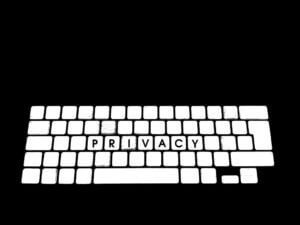The Protection of Personal Responsibility
Published on May 1, 2017, at 12:19 p.m.
by Allison Morris.
Privacy has traditionally been known as the concept of being free from the public eye. In most cases, individuals have the freedom of choosing what elements of their lives are kept private and what is shared with others.

The definition of privacy is something that varies between generations of people as the mere presence of the internet and social media has changed the meaning of the word and all it entails. What a millennial may consider “personal privacy” could be completely different from what his or her grandmother considers it to be. It isn’t just millennials’ perceptions of privacy that have changed; media law, in general, is changing and evolving day by day.
Dr. Matthew Bunker, a professor at The University of Alabama who teaches Mass Communication Law, believes that the changes in the idea of privacy and media law itself isn’t necessarily negative, but it does open the door to legal issues that didn’t exist before the internet and especially social media.
“It used to be that media law generally applied primarily to media corporations because they were the only entities that could reach large numbers of people through print, broadcast and other media,” said Bunker. “Now with social media, everyone is a potential ‘publisher’ who can libel someone else or invade someone else’s privacy.”
An article published in American Business Law Journal presents modern-day situations in which employees are fired for making negative comments about their workplace or sharing personal business information with their followers. The problem here seems to be freedom of speech. The article further raises the question of what rights employees have to express their opinions publicly, without the fear of losing their jobs.
According to Dr. Bunker, though some states have laws in place against retaliatory firing, many states do not. Therefore, individuals must understand the powers employers currently (and legally) have to monitor the online activity of their employees.
“A private employer has much more of a free hand to respond to employee speech, including firing employees who express views the employer disagrees with,” said Bunker. “That’s simply the state of the law.”

For those on the job search, understanding what rights we do and do not have online is important in creating a positive online persona — one that is more likely to attract potential employers. Lang Hamilton, business development manager of Fit Recruiting in Mobile, Alabama, emphasizes the importance of monitoring one’s own posts and keeping a clean image for potential employers.
“What you put on the internet is a direct reflection of you,” said Hamilton. “The reason hiring managers look to social media is not to try and find something that they don’t like; it is to find out if you will fit in with their team.”
Research from Pew suggests that millennials are becoming more aware of the rules and regulations of the online world. This is due, in part, to emerging court cases regarding information shared on social media. While millenials’ awareness is improving, the Pew research shows that few of them are willing to forfeit their engagement on social media — even if it means the nature of their online presence makes them more susceptible to judgment from peers, mentors, current employers and future bosses.
While individuals with this attitude certainly have a right to their opinions, and to an extent, a right to the things they are posting, this attitude could jeopardize relationship-building — something especially important in the PR field. According to Hamilton, even if laws can protect you from being penalized or reprimanded for what you post, you should still strive to impress employers and future employers, as social media is often one of the first impressions of you that they have. It all comes down to taking personal responsibility for the things you post rather than relying completely on the law.
“I think it is all about personal responsibility,” said Hamilton. “Making laws helping people to be more private on social media is counterintuitive to social media’s mission.”
Regardless of how far legal protection extends, as PR practitioners and seasoned professionals, understanding media law and applying this knowledge to better ourselves and our clients is key. Simply possessing legal knowledge has the potential to provide as much protection as the laws themselves do.
“There can be so many potential minefields in the PR field, both for the practitioner and the client. I think that professionals who don’t arm themselves with a solid understanding of this area of the law are playing a dangerous game,” said Bunker.
As for landing that dream job, knowing the ins and outs of media law is important too. Information is so easily shared these days and deleting a post doesn’t always mean it is gone forever or that it can’t come back to haunt you. While a lack of understanding of media law could potentially pose a number of problems professionally, remembering social media’s purpose is the key to providing the online world with a solid representation of who you are.

“If you think of social media as being just a slightly more professional version of yourself, it won’t be an issue. In fact, social media may then become a positive,” said Hamilton.
Confusing and detailed as it may seem, media law provides a strong basis for understanding the rules of communication before and during the lifetime of our careers. Knowing just how far the laws extend helps us make the best decision for ourselves and our clients. As Bunker and Hamilton both emphasize, personal responsibility online can protect us when laws cannot.




